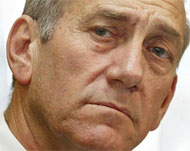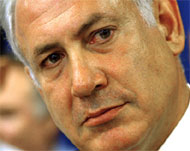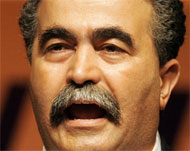Who after Sharon? The contenders
As doctors continue trying to save the life of Ariel Sharon it has become clear that the prime minister’s long career in Israeli politics is over.

Having directed policy in a very decisive and personal fashion during his leadership his departure will leave a vacuum at the heart of domestic politics.
With a general election due on March 23 it is unclear how Sharon’s new centrist movement Kadima will fare and how new leaders of Likud and Labour can benefit.
Here we profile some of the leading Israeli political figures and possible successors to Ariel Sharon:
Shimon Peres
At the age of 82 former prime minister Peres has seen and done it all in Israeli politics.
As well as leading the country twice, between 1984-1986 and 1995-1996, he has held pretty much every ministerial post.
 |
|
Peres has never won an election |
The surprise from observers in November 2005 when Peres lost the leadership elections of the Labour party to Amir Peretz was matched when he later transferred his allegiances to Kadima.
His move to Sharon’s new centrist party was seen as crucial in garnering support across the political spectrum for further reforms and peace efforts.
Ever ambitious, he is now sure to want one of the top jobs, but at his age and having never won a national vote as leader it is doubtful he will be the next prime minister. It is thought he would however, accept a post as foreign minister or deputy prime minister.
Born in Poland, Peres emigrated to Israel with his family in 1934. In 1994 he won the Nobel Peace Prize with Yasser Arafat and Yitzhak Rabin.
Ehud Olmert
 |
|
An Olmert premiership would |
A huge fan of Beitar Jerusalem football club Ariel Sharon’s deputy and now Israel’s acting prime minister has always been a loyal team player.
Olmert, who recently followed the prime minister from Likud to Kadima, is a long-standing close political ally of Sharon.
He was closely involved with the Gaza pullout and were his current position to become permanent it would represent continuity perhaps more than any other leading politician.
He is rumoured to want the top job on a permanent basis and has a reputation as being tough and decisive and a smooth media operator.
After an early career in the military he served in several ministerial posts before becoming mayor of Jerusalem in 1993 and serving two terms until 2003 when he was reelected to the Knesset.
Despite representing continuity there are doubts over his popularity with voters and whether he would be able to unify the differing political ambitions in Kadima.
Benyamin Nethanyahu
 |
|
Netanyahu has been a staunch |
The new leader of the Likud party is arguably one of Israel’s most internationally recognisable politicians.
He was prime minister between 1996 and 1999, and recently served as foreign minister in the government of Ariel Sharon.
He quit last year however, in protest at Israel’s withdrawal from Gaza, and has been a staunch critic of Sharon’s policy. He also opposed the Oslo peace accords and the land for peace policy.
He is as seen as a hawk and became leader of Likud when Sharon set up Kadima.
Recent opinion polls only put his party in third place, as he is seen as losing ground to the centrist politics favoured by Sharon and his supporters.
Netanyahu speaks English with a slight American accent, due to his education in the US, and is seen as consummate media performer.
Amir Peretz
 |
|
Peretz has a strong support base |
Peretz became leader of the Labour Party after, somewhat surprisingly, defeating Shimon Peres in elections in November. He immediately pulled the party out of Sharon’s coalition government, triggering the elections in March.
Born in Morocco, Peretz was leader of the Histadrut trade union federation from 1995 until he resigned his position following his victory in November.
He merged his own Am Ehad party with Labour in 2004 and has long been popular with many of Israel’s working class, adopting a dovish position on relations with Palestine.
Despite re-energising Labour since become leader it is unclear how this will affect the polls. It remains to be seen how Labour will deal with Peres’ defection to Kadima and the fact that Sharon’s Gaza pullout and revised strategy of unilateral separation between Palestine and Israel has undermined their key appeal to voters.
A Sephardi jew, if Peretz were elected as prime minister in March he would become Israel’s first non-Ashkenazi (A jew of European origin) leader.
Tzipi Livni
 |
|
Tzippi Livini is considered too |
The highly regarded justice minister was another high profile defection for Likud to Kadima and is head of the new movement’s election campaign.
A relative political newcomer compared to the other figures, she was first elected to the Knesset in 1999, Livni was seen as one of the more “dovish” elements of Likud.
She was a key member of Sharon’s team overseeing the disengagement from Gaza and had previously mediated between rival factions.
She is believed to have wanted Ehud Olmert’s role as deputy leader of Kadima, a sign of potential future rivalry.
Despite having gained respect from across the political spectrum, the former lawyer may be deemed as too inexperienced for the top jobs just yet.